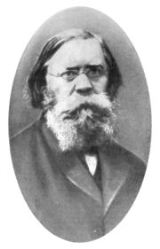
Peter Lavrovitch Lavrov
Encyclopedia
Pyotr Lavrovich Lavrov—also known as a coup, putsch, and overthrow—is the sudden, extrajudicial deposition of a government, usually by a small group of the existing state establishment—typically the military—to replace the deposed government with another body; either...
would be easy in Russia, the creation of a socialist society needed to involve the Russian masses. He founded the journal Forward! in 1872, its first issue appearing in August 1873. Lavrov used this journal to publicize his analysis of Russia's peculiar historical development.
Lavrov was a prolific writer for more than 40 years. His works include The Hegelian
Georg Wilhelm Friedrich Hegel
Georg Wilhelm Friedrich Hegel was a German philosopher, one of the creators of German Idealism. His historicist and idealist account of reality as a whole revolutionized European philosophy and was an important precursor to Continental philosophy and Marxism.Hegel developed a comprehensive...
Philosophy (1858–59) and Studies in the Problems of Practical Philosophy (1860). While living in exile, he edited his Socialist review, Forward!. A contribution to the revolutionary cause, Historical Letters (1870) was written under the pseudonym Mirtov. The letters greatly influenced the revolutionary activity in Russia. He was called "Peter Lawroff" in (1899–1900) by K. Tarassoff.
Revolutionary Ideology
In Peter Lavrov's view, socialism was the natural outcome of Western European historical development. He believed that the bourgeois mode of production planted the seeds of its own destruction. "Lavrov began his revolutionary career with the assumption that the future belonged to West European scientific socialism, as created by material conditions of West European civilization." Lavrov recognized that Russia's historical development was significantly different from that of Western Europe, though he still maintained hope that Russia might join in the greater European socialist movement.In Lavrov's analysis of Russia's historical development, he concluded that the essence of Russia's peculiarity rested on the fact that they had not experienced feudalism and all of its progressive features. Russia had been isolated from European development by the Mongol conquest in the thirteenth century. In 1870, Lavrov published a comparison of the levels of economic, political and social development of several Western European nations and Russia, noting the relatively backward and poor condition of Russia.
Despite Lavrov's historical analysis, he still believed a socialist revolution was possible in Russia. One of his contemporaries, Georgi Plekhanov
Georgi Plekhanov
Georgi Valentinovich Plekhanov was a Russian revolutionary and a Marxist theoretician. He was a founder of the Social-Democratic movement in Russia and was one of the first Russians to identify himself as "Marxist." Facing political persecution, Plekhanov emigrated to Switzerland in 1880, where...
, believed that a socialist revolution would only come with the development of a revolutionary workers’ party. In other words, he believed that Russia would have to wait for the same historical development experienced by the West. Lavrov rejected this outlook, believing it possible to create socialism by basing revolutionary tactics on Russia's individual history. Almost 90 percent of Russia's population were peasants, and there was also the intelligentsia: a unique bunch of people without any class affiliations, who, "unlike other elements of Russian society, were unflawed by the past."
Thus, Lavrov felt that a true socialist revolution would have to integrate the rural population in order to succeed. Lavrov considered the intelligentsia the only portion of society capable of preparing Russia for participation in a worldwide socialist revolution. He gave them the task of compensating for the shortfalls of Russian historical development by organizing the people, teaching them scientific socialism, and finally, preparing to take up arms with the people when the time would come.

